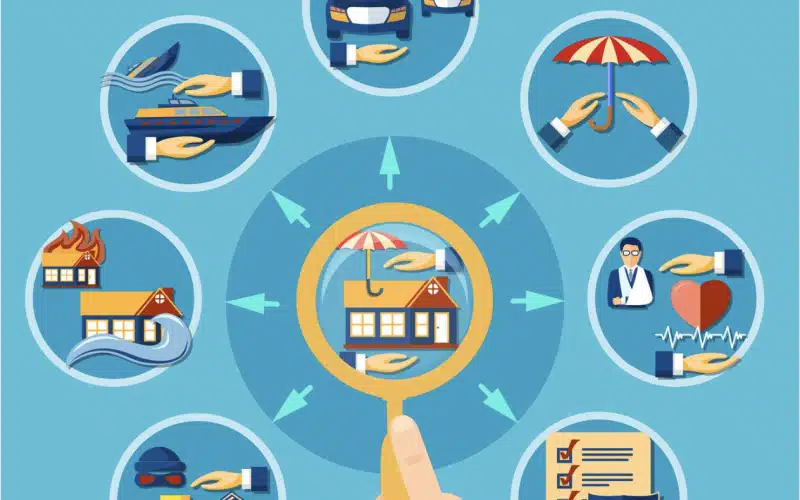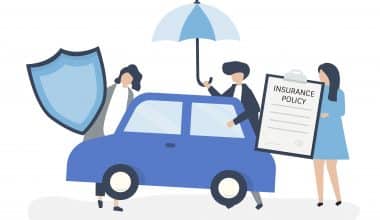You can never expect everything will go smoothly without something unfortunate happening. This is why finding the best commercial insurance goes beyond choosing the right policy, as getting insured through the right companies can make a huge difference.
Businesses that own property, tools, equipment, furniture, and even buildings need commercial property insurance. The top insurance carriers in this field will have high total insurable value, provide the option for actual cash value and replacement cost value, and include business loss income into their policy.
Getting the right coverage can help you be sure you’ll be able to take on whatever comes your way in business. Whether you have a fleet of vehicles to insure or just need liability coverage for freelance work, having the right coverage can be a lifeline if you ever face a lawsuit, theft, disaster or other unexpected events.
Best commercial insurance companies
The Hartford
The Hartford’s commercial property policies are divided into two categories: small businesses with less than $200 million in total insurable value and large businesses that go over this threshold. While the essential coverage for both remains the same, each policy is tailored toward the specific needs that change based on company size.
For example, large property insurance claims are handled by specialized agents and include loss control services from The Hartford’s risk engineering team.
Aside from general liability, commercial property insurance is the most universally carried business coverage you’ll find since it safeguards everything from tools and equipment to office furniture from theft and damage. The Hartford offers commercial property policies that apply to any business, from entrepreneurs who work from home to large corporations with hundreds of millions of dollars in property to insure.
Commercial property quotes from The Hartford are generally available online. However, you may need to work with an agent to get a quote if you have a large company or need specialized coverage.
You should also keep in mind that even though The Hartford writes commercial property policies for businesses of any size, this insurer is mostly geared toward smaller companies. This is evident in the fact that it wrote more small business premiums ($4.1 billion) than midsize and large business premiums combined ($3.3 billion) in 2022.
Next Insurance
Next Insurance offers commercial property insurance that can be customized to your specific business needs. Its property insurance can cover business goods and gear, inventory, buildings, equipment breakdowns, and business income interruptions. You decide what you want and need, and its quoting system lets you customize the policy to fit your specific business needs.
For example, it offers property insurance for construction contractors that is tailored to fit the specific industry in which they work. If you request a quote for a roofing business, Next will suggest we add roofing as a stand-alone coverage to the quote. It will also offer a detailed explanation of what the coverage is and why your business may want it.
However, the provider lacks a 24/7 call center.
Progressive
With policies written for over a million commercial vehicles as of 2022, Progressive is easily the biggest commercial auto insurer and one of the best commercial insurance companies in the United States. While competitors impose limitations on certain vehicle types and industries, this carrier covers a wider variety than anyone else.
It offers policies for trucks, buses, trailers, and even personal vehicles that are partially used for business purposes.
According to Progressive, the average monthly premium for a business auto customer is around $188 per month. However, specific industries will pay far more; for example, commercial truck insurance through Progressive costs between $640 and $982 per month on average, and the average tow truck policy comes to $448 per month.
Commercial auto policies from Progressive also offer unmatched convenience, including 24/7 customer phone service and coverage. You can also save money on your business insurance policy when you bundle commercial auto with another type of coverage, such as general liability or a BOP.
However, there are a few limitations to Progressive’s commercial auto policies. Specific types of vehicles are excluded, including golf carts and emergency vehicles such as ambulances and fire trucks; trailer-only policies are also excluded. You may find that fewer customization options are available compared to other providers.
If you’re purchasing more than just auto insurance for your business, know that Progressive does outsource other types of commercial policies to third parties.
Obie
Obie is a new provider that specializes in landlord insurance. Its entire process is online, intuitive, and fast. You can quote and bind a policy online, for same-day instant coverage, 24/7. Coverage is also available for building and detached structures.
Obie offers landlord insurance. Also, if the home you are renting is furnished, then you can obtain commercial property insurance for the contents. It is the only carrier that automatically includes an inflation guard in every quote.
The only downside is the lack of a 24/7 call center and a mobile app.
Hiscox
A dedicated small business insurer, Hiscox offers a wide range of insurance. However, for those who want commercial property, most of its offerings are for consultants. Some types that it covers are business, education, marketing, human resources (HR), information technology (IT), and management consultancies.
For commercial property, Hiscox focuses on smaller businesses with revenue limits of $3 million. It has limits of up to $4 million; however, limits that high are unavailable online, so you will have to call the provider directly. The deductible can range from $500 to $10,000, and the limit for building coverage is set at $500,000.
Because of the structure of its policy, the coverages target smaller one- to three-person operations, most likely a home-based business or those in a rented office.
Hiscox’s commercial property coverage is available for contents, equipment, tenant improvements, and personal effects. It does not always take deductions for depreciation, and you can insure items as replacement cost value (RCV).
However, its lower score in customer satisfaction reflects the higher-than-expected complaints received by the NAIC and its lack of a 24/7 claims line.
Nationwide
Nationwide is one of the best commercial insurance companies with its policy options for both small and large businesses. It provides coverage for just about every type of protection you can think of. This includes traditional policies like general liability and umbrella insurance, additional protection from equipment failures and employment-related lawsuits, and even more modern options with cybersecurity protection.
Nationwide also receives accolades from several industry rating agencies. AM Best has issued an A+ (Superior) financial stability rating. It also finished third in the 2022 J.D. Power Small Commercial Insurance study.
One of the few drawbacks to Nationwide is that online quotes are limited to five types of coverage. For more detailed policy information, you’ll need to call and speak with an agent. There are also a few small business industries that don’t get specific attention, such as hotels and real estate professionals.
Insureon
Insureon is an online marketplace that makes finding the best coverage in your state easy with a single form that returns quotes from multiple providers. Although it doesn’t underwrite any of its policies, the company is licensed to provide services in all 50 states and can often help you get coverage within 24 to 48 hours.
This carrier works with dozens of commercial insurance providers, allowing you to save time by filling out just one application to get multiple quotes for your business. While Insureon’s application is more complex than what you’ll find on some insurers’ websites, it is still much more efficient than figuring out which companies offer liquor liability coverage in your area and asking for quotes one by one.
Policy pricing for liquor liability will vary depending on your location, how long you have been in business, and what percentage of your overall revenue comes from alcohol sales. According to Insureon, the median annual cost of liquor liability insurance is about $2,060 per year for bars, $545 per year for restaurants, and $775 per year for catering companies.
Berkshire Hathaway
The well-known parent company of GEICO, Berkshire Hathaway also provides commercial insurance through two channels:
- biBERK, a full-service small business insurance company, and
- THREE, a newer endeavor that has made waves in the industry for offering a simple three-page policy.
Companies looking for a customizable business owner’s policy can go through biBERK, which provides both general liability and property coverage. General liability covers property damage, bodily injury, product liability, and copyright-related matters. Property coverage will include building and leased spaces, business income, and contents inside a company’s building.
For additional customization options, business owners can choose from add-ons like cybersecurity and employment practices liability.10
THREE offers a more comprehensive option, with all the elements of a business owner’s policy plus business interruption, cybersecurity, workers’ compensation, and commercial auto. This affordable, all-inclusive policy is ideal for small businesses that would otherwise need to combine a BOP with additional expensive coverage. W
Even though both biBERK and THREE are newcomers in the industry, they are both backed by Berkshire Hathaway, which has been in the insurance industry since the 1960s.
Chubb
Chubb is one of the best commercial insurance companies that writes $40 billion in individual and commercial policies annually, offering a particularly impressive lineup of business insurance coverage.
Its Customarq General Liability policy is well-suited for small businesses and multinationals alike in more than a thousand different industry classification codes. This policy covers just about everything from bodily injury and property damage to litigation and vendors. However, unlike some competitors, global coverage isn’t included and must be purchased separately.
Companies that need something more customized can add Continuum from Chubb onto any general liability policy or purchase it individually. This additional protection covers items such as successor liability and discontinued products. Businesses with less than $30 million in annual revenue can also take advantage of Chubb’s business owner’s policy.
This combines general liability with commercial property and other industry-specific types of coverage.
It’s also worth noting that Chubb scores among the best in the industry in financial stability and customer satisfaction. The provider holds an A++ financial strength rating from AM Best.4 Chubb also took second place in the 2022 J.D. Power U.S. Small Commercial Insurance Study
Unfortunately, Chubb doesn’t offer online quotes for commercial insurance policies and requires all businesses to purchase coverage through an agent.
Thimble
Thimble is a managing general agent (MGA) that works with multiple carriers to deliver small business insurance. One of the best commercial insurance companies, it offers commercial property insurance and has a certificate manager platform that is available for property managers. The system is entirely free for policyholders.
Its simple and quick quoting system and the ability to quickly change coverage online or on the app make it one of the best. This also includes the ability to add any additional insureds for the properties you manage.
The only downsides are a lack of a 24/7 call center and inaccessibility when calling to speak with someone.
Types of Commercial Insurance
Federal regulations require certain types of insurance such as workers’ compensation. Additionally, certain states may require certain types of businesses to have additional coverage types. In most situations, it’s advisable for businesses to protect themselves by having coverages that aren’t legally required.
Here are seven common types of business insurance:
Commercial general liability insurance
Commercial general liability insurance is a type of policy for all businesses. It’s considered comprehensive insurance, although it does not protect against all risks. General liability provides coverage for bodily injury, property damage, medical expenses, libel, slander, defending lawsuits, and settlement bonds or judgments.
Professional liability insurance
Unlike general liability insurance, which is for any business, professional liability insurance (PLI) is designed for businesses that provide services. Coverage is for loss caused by the service provided. It protects against expenses related to malpractice, negligence, or errors.
Commercial property insurance
This type of insurance is designed for businesses with significant physical property, such as equipment, signage, inventory, and furniture. It protects the business from losses in events such as fire, storm, or theft. Property insurance can cover, for example, damage to things like inventory, computers, furniture, or signage.
Note: Commercial property insurance typically doesn’t cover the costs of events like floods and earthquakes. If your area is at risk for these events, you’ll need a separate policy.
Product liability insurance
Product liability insurance is designed for businesses that are involved with products, such as manufacturers, wholesale distributors, and retailers. It protects a business from costs associated with damages caused by products, such as a defective product causing bodily injury or harm.
Without product liability insurance, a business can be vulnerable to paying for expensive lawsuits.
Vehicle insurance
Any vehicles used for business should be insured. Whether you have vans, busses, tractor-trailers, or passenger cars, you will need insurance in case of damage to the vehicles or cargo, or injuries to others. Each state has a minimum amount of required insurance.
Several factors can affect the price of vehicle insurance, such as the driver’s driving record and the condition of the vehicle.
Business interruption insurance
Business interruption (or continuation) policies are a type of insurance that is especially applicable to companies that have physical locations, such as retail stores or manufacturing facilities.
They compensate a business for its lost income due to events that cause a disruption to the normal course of business. It’s typically added on as a rider to a property insurance policy or as part of a business owner’s policy.
Home-based businesses
If you’re running a home-based business, you will likely need additional coverage for equipment and inventory. Standard homeowner’s policies don’t typically cover home-based businesses like commercial property insurance covers businesses.
You can add home-based business insurance to a homeowner’s policy as a rider for a small amount of coverage for equipment and a small amount of liability coverage.
How much does commercial insurance cost?
This will depend on a number of factors about your business and the insurance coverage. Progressive reports the median monthly cost of a business owner’s policy to be $70. The Hartford also shares that the median monthly cost of its commercial policies is $55.
How do you get commercial insurance?
You can get commercial insurance through an insurance agency that provides the type of policy you need. A commercial insurance agent at an insurance company can give you a quote and guide you through your options and application process.
You can often get a policy online or by calling the insurance agency.
Recommended Articles
- Business Interruption Insurance: What Does It Mean & Cover?
- CAR INSURANCE COLORADO: Coverage, Cost & Best Options
- Alabama Car Insurance: Coverage, Cost & Best Options






